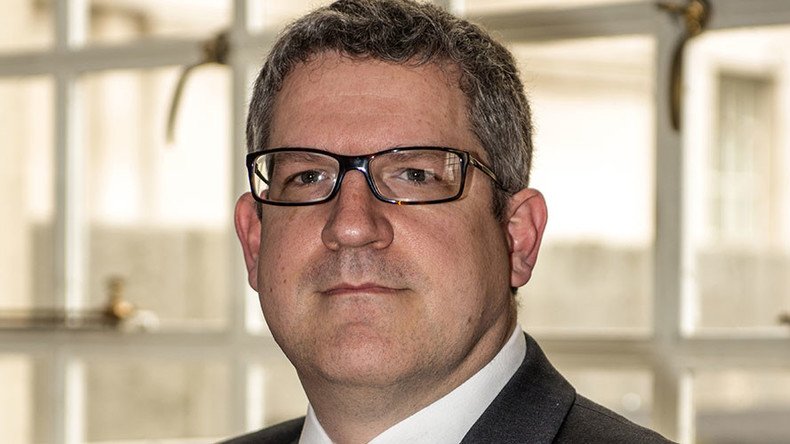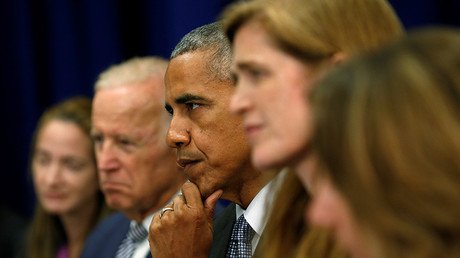UK parliament weighing legislation to ‘extend massively surveillance powers of British spies’

The UK spy agencies are under political pressure because two weeks ago the Investigatory Powers Tribunal ruled they had been conducting illegal surveillance for the last 17 years, former MI5 intelligence officer Annie Machon told RT. What a difference two weeks can make.
What a difference two weeks can make.
The head of Britain's domestic intelligence agency Andrew Parker now says Russia poses a growing threat to the UK and accuses Moscow of pushing its foreign policy in “increasingly aggressive ways.”
RT: As a former intelligence officer, what do you make of Parker's statement?
Annie Machon: I think it is politically motivated in terms of its timing. The UK spy agencies are currently under a bit of political pressure because only two weeks ago it was ruled by the Investigatory Powers Tribunal, the only body that has any power of oversight over the three intelligence agencies in the UK, it was ruled that they had been breaking the law and making illegal surveillance actions for the last 17 years. That was two weeks ago. This week, at the moment, what is known as the Investigatory Powers Bill is going through parliament and will be voted on, which will legalize what has previously been illegal and extend massively the surveillance powers of British spies against UK citizens and the citizens of the rest of Europe. So, I think his reaching out to do a historic first newspaper interview by a serving head of intelligence agency in the UK to the Guardian of all newspapers, which of course broke the Snowden stories, was interesting timing and placing of that story.
RT: Why is he focusing on Russia again while other problems could be more important such as the terror threat posed by Islamic State?
AM: Absolutely, and it would make so much more sense for the UK spies to cooperate and work with the Russian intelligence infrastructure as well as European partners, as well as the US, if necessary to try and get rid of the ISIS threat, for example. But what we are seeing again is this sort of UK vassalage to the US. We are seeing the UK being the lesser partner. GCHQ, as a listening post, is prostituting itself literally for money to the NSA to the detriment of UK national security for many years, as Snowden disclosed. It would be better if all these countries got together and then tried to crush the ISIS threat to get rid of it, to try to deal with it. Instead what we are seeing, particularly in the Western media, is indeed the demonization of Russia where their bombing of ISIS in Aleppo and collateral damage to civilians is seen as this terrible war crime, whereas the NATO bombing of ISIS and the collateral damage of civilians who are being actively used as human shields in Mosul, in Iraq is seen as a liberating force. This dichotomy is very obvious to most people and it is very difficult therefore to take some such pronouncements from the head of MI5 particularly seriously.
RT: There is this common threat, Al-Nusra. ISIS, but how much of the current strife is over competition in the region. Does that play into the equation?
AM: I think it does, it is very unfortunate. And of course, this goes back to money and it goes back to energy supplies where the Russian client Teheran wanted to build a pipeline which President Assad in Syria had agreed to export Iranian energy to Europe, which is a huge market. The Qatari government and the Saudis wanted to build their own pipeline via Syria into Europe and this was backed by America. This is what it all comes back down to. It is nothing to do with the rights and wrongs of Aleppo or Mosul, or anything. The problem is, there are competing interests of backing client states within the Middle East. And those client states, particularly Saudi Arabia and Qatar, prop up the petrodollar monopoly. If they don’t get access to that European market, if they can no longer trade effectively in the petrodollar, then it will seriously weaken the American economy. This is what it is all about. And also Russia, of course, wants to protect its client state Iran. So, that’s where the clash comes from. But it will be naïve to think that it is just that. All intelligence agencies spy on all countries for all sorts of advantage. Only a few weeks ago we saw the CIA saying that they are going to aggressively hack the private communications of the Russian elite in retaliation to what they perceive to be aggressive hacking of the Hillary Clinton camp in the run up to the US election. This goes on every which way, we all do it, they’ve all done it.
The statements, views and opinions expressed in this column are solely those of the author and do not necessarily represent those of RT.














